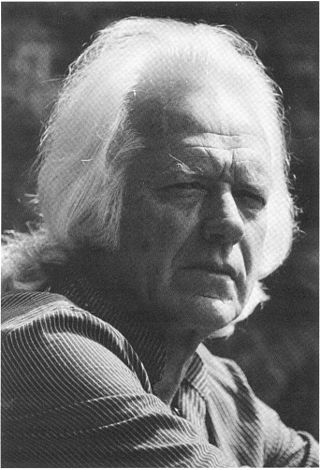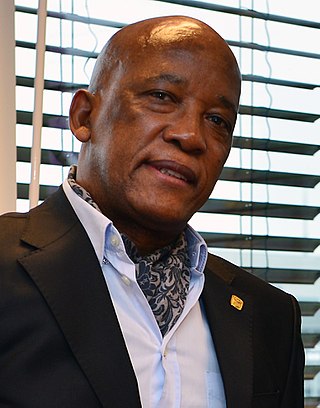Related Research Articles

Ossip Zadkine was a Russian Empire-born French artist. He is best known as a sculptor, but also produced paintings and lithographs.

Pisgat Ze'ev is an Israeli settlement in East Jerusalem and the largest residential neighborhood in Jerusalem with a population of over 50,000. Pisgat Ze'ev was established by Israel as one of the city's five Ring Neighborhoods on land effectively annexed after the 1967 Six-Day War.
Gerard Sekoto, was a South African artist and musician. He is recognised as a pioneer of urban black art and social realism. His work was exhibited in Paris, Stockholm, Venice, Washington, and Senegal, as well as in South Africa.

Z'EV was an American poet, percussionist, and sound artist. After studying various world music traditions at CalArts, he began creating his own percussion sounds out of industrial materials for a variety of record labels. He is regarded as a pioneer of industrial music.
David Goldblatt HonFRPS was a South African photographer noted for his portrayal of South Africa during the period of apartheid. After apartheid had ended he concentrated more on the country's landscapes. What differentiates Goldblatt's body of work from those of other anti-apartheid artists is that he photographed issues that went beyond the violent events of apartheid and reflected the conditions that led up to them. His forms of protest have a subtlety that traditional documentary photographs may lack: "[M]y dispassion was an attitude in which I tried to avoid easy judgments. . . . This resulted in a photography that appeared to be disengaged and apolitical, but which was in fact the opposite." He has numerous publications to his name.

William Kentridge is a South African artist best known for his prints, drawings, and animated films, especially noted for a sequence of hand-drawn animated films he produced during the 1990s. The latter are constructed by filming a drawing, making erasures and changes, and filming it again. He continues this process meticulously, giving each change to the drawing a quarter of a second to two seconds' screen time. A single drawing will be altered and filmed this way until the end of a scene. These palimpsest-like drawings are later displayed along with the films as finished pieces of art.
Walter Whall Battiss was a South African artist, also known as the creator of the "Fook Island" concept.

Paul Johan du Toit was a South African artist, working in painting, sculpture, paper and mixed media. His exhibits have been displayed globally. Most notably, three of his sculptures were selected for the 2001 Florence Biennale.

Willem Boshoff is one of South Africa's foremost contemporary artists and regularly exhibits nationally and internationally.

Ze’ev Raban (22 September 1890 – 19 January 1970), born Wolf Rawicki (Ravitzki), was a leading painter, decorative artist, and industrial designer of the Bezalel school style, and was one of the founders of the Israeli art world.
Tyrone Appollis is a South African artist and poet.

Edoardo Daniele Villa (1915–2011) was a notable South African sculptor of Italian descent who worked primarily in steel, and bronze.
Zanele Muholi is a South African artist and visual activist working in photography, video, and installation. Muholi's work focuses on race, gender and sexuality with a body of work that dates back to the early 2000's, documenting and celebrating the lives of South Africa's Black lesbian, gay, transgender, and intersex communities. Muholi is non-binary and uses they/them pronouns, explaining that "I'm just human".
Johan Thom, is a visual artist who works across video, installation, performance and sculpture. He has been described as one of South Africa's foremost performance artists.
Durant Sihlali was a South African artist. He was born in Germiston, was Head of Fine Arts at the Federated Union of Black Artists (Fuba) from 1983 until 2004 and exhibited in Nuremberg, Athens, and Palermo.

Dikobe Ben Martins, is a former Minister of Energy and has held other posts in the Cabinet of South Africa. He has served in Parliament since 1994 and has been a Central Committee Member of the South African Communist Party.
Leslie J. Sacks was a Los Angeles-based art dealer and founder of Women's Voices Now.
Johannes Phokela is a South African painter and sculptor.
Sydney Kumalo (1935–1988) was a South African contemporary artist and sculptor. He's best known for his work with metal and creating metal figures with his sculptures.
Nompumelelo Ngoma is a visual artist and printmaker. Her work is in the permanent collection of the Smithsonian's National Museum of African Art.
References
- 1 2 "Johan Oldert". Crouse Art Gallery website. Retrieved 28 February 2017.
- ↑ "JOHAN OLDERT (1912-1984)". John Smith website. Retrieved 3 March 2017.
- ↑ Coulson, Michael (April 2009). "Latest South African Art Auction Update". 'Business Art' supplement to South African Art Times. Johannesburg, South Africa. Retrieved 3 March 2017.
- ↑ "Center Bulletin, Volume 4, Issue 30 May 7, 2008". Menachim Begin Heritage Center website. Retrieved 3 March 2017.